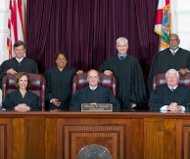Article from: www.thenewspaper.com/news/37/3729.asp
3/1/2012
Florida Supreme Court Limits Fellow Officer Rule
Fellow officer rule does not allow police to introduce hearsay testimony during a traffic stop, Florida Supreme Court ruled.
 Under the "fellow officer rule," courts presume that what one officer knows at a crime scene is presumed to be shared among all officers present. This allows a policeman to develop probable cause and then turn to his partner to conduct the actual arrest. As Florida's Supreme Court ruled last week, this doctrine does not mean an officer can provide hearsay testimony in court about things only his partner witnessed.
Under the "fellow officer rule," courts presume that what one officer knows at a crime scene is presumed to be shared among all officers present. This allows a policeman to develop probable cause and then turn to his partner to conduct the actual arrest. As Florida's Supreme Court ruled last week, this doctrine does not mean an officer can provide hearsay testimony in court about things only his partner witnessed.
In a 6-1 decision, the high court overturned the conviction of Michelle Bowers for driving under the influence of alcohol (DUI) and marijuana possession. Officer Suskovich had stopped Bowers for an alleged traffic infraction on March 27, 2007. At trial, Bowers argued this initial stop was unlawful, but Officer Suskovich did not show up in court. So Officer Tracy, who came to the scene to arrest her for DUI , attempted to testify about what Suskovich had told him.
"At the time of the stop, Officer Tracy had no knowledge as to the information that Officer Suskovich possessed when the stop was initiated," the high court wrote. "Officer Tracy was not involved at that time in an ongoing investigation of Bowers; he was not present at the time of the stop and did not witness Bowers' driving -- he learned the relevant information after the fact, when he arrived to perform a DUI investigation and arrest."
Bowers objected that this was hearsay, but prosecutors insisted it was allowed under the fellow officer rule. The trial judge initially sided with the prosecution, but he later decided to suppress the evidence of the stop. A circuit court overturned that decision. The court of appeals sided with Bowers, as did the state supreme court.
"We hold that the fellow officer rule does not allow an officer who does not have firsthand knowledge of the traffic stop and was not involved in the investigation at that time to testify as to hearsay regarding what the initial officer who conducted the stop told him or her for the purpose of proving a violation of the traffic law so as to establish the validity of the initial stop," the high court concluded.
A copy of the decision is available in a 130k PDF file at the source link below.
Source: Florida v. Bowers (Florida Supreme Court, 3/1/2012)
Permanent Link for this item
Return to Front Page
 Under the "fellow officer rule," courts presume that what one officer knows at a crime scene is presumed to be shared among all officers present. This allows a policeman to develop probable cause and then turn to his partner to conduct the actual arrest. As Florida's Supreme Court ruled last week, this doctrine does not mean an officer can provide hearsay testimony in court about things only his partner witnessed.
Under the "fellow officer rule," courts presume that what one officer knows at a crime scene is presumed to be shared among all officers present. This allows a policeman to develop probable cause and then turn to his partner to conduct the actual arrest. As Florida's Supreme Court ruled last week, this doctrine does not mean an officer can provide hearsay testimony in court about things only his partner witnessed.